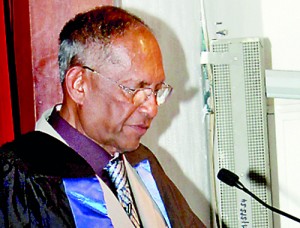Sunday Times 2
Tracing mankind’s fascination with our origins and purpose
Speaking at the annual Ray Wijewardene Memorial Lecture last Thursday, Prof. Chandra Wickramasinghe drew a long arc as he traced mankind’s profound fascination with our own origins and purpose. At the event, which drew a large crowd that overflowed into standing room only, Prof.Wickramasinghe spoke of how this craving to know has always found voice in our art – from cave paintings to the work of Paul Gauguin (in particular the artwork ‘Where Do We Come From? What Are We? Where Are We Going?’).

Prof. Chandra Wickramasinghe delivering the lecture
Later, it was tackled in earnest in religion and superstition, and then even later by the philosophers – whose attempts if unconvincing to modern eyes are still pure poetry. (Aristotle, says Prof. Wickrasamasinghe hypothesised that ‘fireflies emerge from a mixture of warm earth and morning dew’) However, it is in science that this well-known astrobiologist places his own faith. In particular, he has become known for his increasing dedication to the theory of panspermia.
The controversial theory holds that life exists throughout the Universe and that it initially hitched a ride to Earth on the back of a meteorite from space.
Prof.Wickramasinghe’s hypothesis remains fiercely contested but his confidence that we would discover the truth of alien beings in the decades to come (sooner rather than later) appeared to be unshaken. “Did life originate in some warm little pond or did it arise in a vast universe?” he asked, clearly in favour of the latter. In the hour that followed, he presented his case, at one point drawing our attention to the incredible complexity of even the simplest bacterium, and voicing his conviction that such complexity could only be cosmic in origin.
Of particular interest to local audiences would have been his reference to the Polonnaruwa meteorite and to the extra-terrestrial organisms researchers reportedly discovered in them. While some of the findings were disputed on the basis that the rocks were not meteorites at all but fulgurites produced as a result of a lightning strike, Prof. Wickramasinghe argued instead that though porous and exhibiting other unusual properties, they were in fact a previously unknown kind of meteorite.
Drawing on his Sri Lankan heritage as well, he spoke of how Buddhist and Hindu philosophy embraced the idea of life on a cosmic scale in contrast to religions that were Earth-centric. He concluded his lecture by sharing his vision that astrobiology holds the answers we have sought for millennia. Pausing to imagine what the revelation of the existence of alien life would mean for our religious beliefs and societal structures he said it would be nothing less than a profound revelation that would throw the world as we know it into tumult. He ended on a note of wonder though as he envisioned a time when we would perceive life as not being limited to the planet but prevalent across the universe, with ourselves but one point on a vast and impossibly intricate web.
Held annually, The Ray Wijewardene Memorial Lecture is delivered in honour of an inimitable Sri Lankan engineer, inventor and aviator. An authority on the vagaries of tropical farming and natural resource management, Ray would introduce himself as a farmer and mechanic ‘who still got his hands dirty’. The Ray Wijewardene Charitable Trust (RWCT) was established in early 2011 to promote Ray’s vision and ideas in Sri Lanka.

